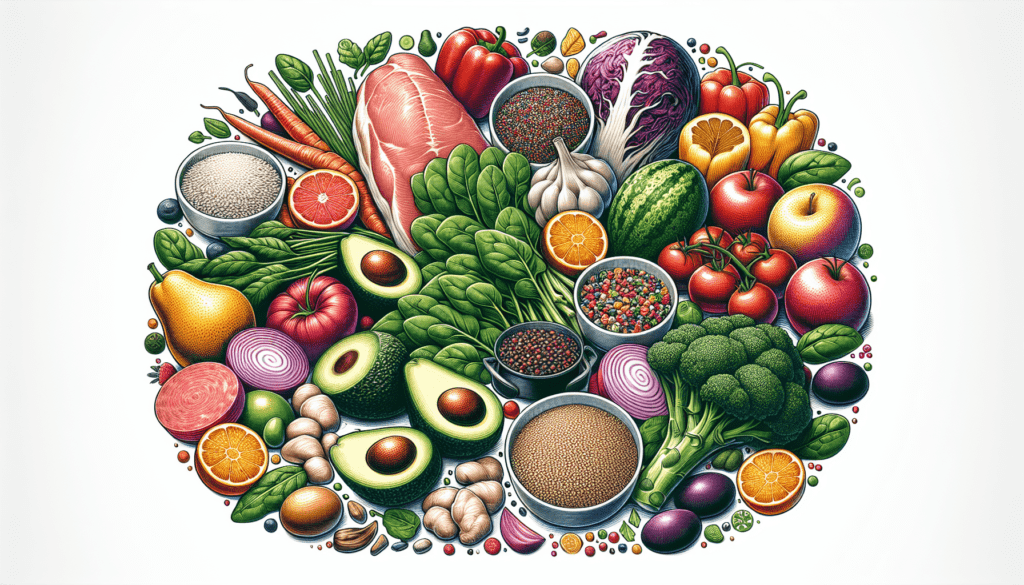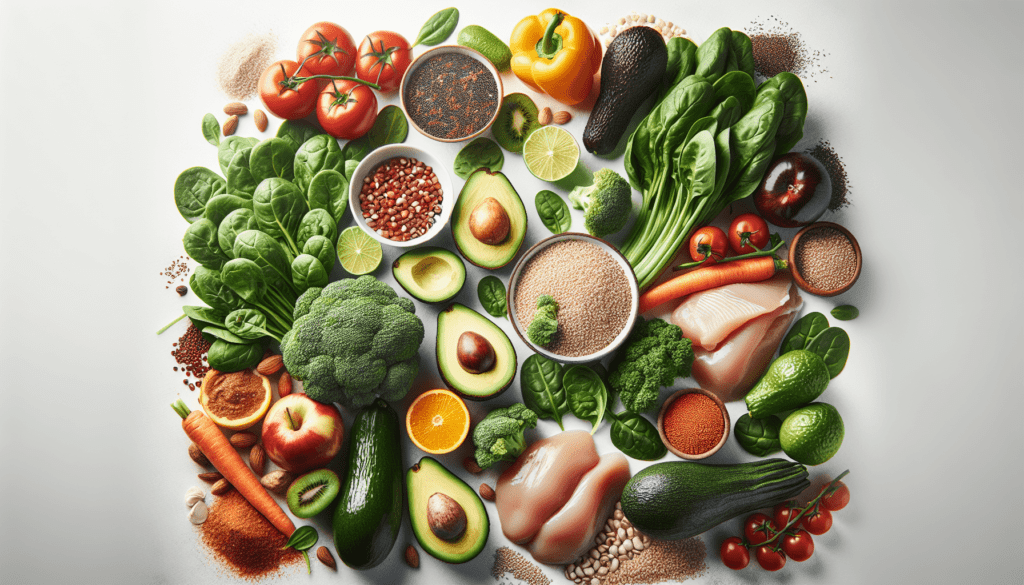Welcome to the world of Mixed Martial Arts (MMA)! As you embark on your journey as a beginner in MMA, it’s important to fuel your body with the right nutrients to support your training and recovery. Incorporating foods like lean proteins, complex carbohydrates, healthy fats, and plenty of fruits and vegetables into your diet can help enhance your performance in the octagon. By making smart food choices, you can optimize your energy levels, improve your stamina, and ultimately reach your full potential as a martial artist. So let’s dive in and explore the top foods you should consider adding to your diet as you begin your MMA journey. Are you thinking about starting your journey as a beginner in Mixed Martial Arts (MMA)? If so, you’re in for an exciting and challenging experience! One key component of becoming a successful MMA fighter is following a well-balanced and nutritious diet. What you eat can significantly impact your performance inside the cage. In this article, we will discuss the top foods that you should incorporate into your diet as a beginner in MMA to help you optimize your training, recovery, and overall health.
Why is Nutrition Important in MMA?
Before we dive into the specific foods you should be eating as an aspiring MMA fighter, let’s first understand why nutrition plays such a crucial role in this sport. MMA is a high-intensity and physically demanding sport that requires a combination of strength, speed, power, endurance, and agility. To perform at your best, your body needs the right fuel to support these demands.
Nutrition not only provides the energy that fuels your workouts and fights but also supports muscle growth, recovery, and overall health. Eating the right foods can help you improve your performance, speed up recovery time, reduce inflammation, and prevent injuries. Additionally, proper nutrition can help you maintain an optimal weight class, ensuring that you are competing at your best and avoiding unnecessary weight cuts.
The Importance of Hydration
Before we delve into the specific foods you should be eating, it’s essential to highlight the significance of hydration in MMA. Hydration plays a critical role in overall performance and recovery. Dehydration can lead to decreased energy levels, impaired cognitive function, reduced muscle function, and increased risk of injury. As an MMA fighter, you need to stay adequately hydrated to maintain peak performance during training sessions and fights.
Water is crucial for regulating body temperature, transporting nutrients and oxygen to cells, removing waste products, and lubricating joints. Aim to drink at least 8-10 cups of water per day, and more if you’re training intensely. On training days, consider sports drinks or electrolyte-enhanced water to replenish lost electrolytes through sweating.
Top Foods for MMA Fighters
Now that we’ve established the importance of nutrition in MMA let’s explore the top foods that you should include in your diet as a beginner in this sport. These foods are rich in essential nutrients, vitamins, minerals, and antioxidants that can help support your training, recovery, and overall health.
Lean Proteins
Protein is an essential macronutrient for MMA fighters as it plays a crucial role in muscle repair, growth, and recovery. When it comes to protein sources, aim for lean options that are low in saturated fats and rich in high-quality protein. Some excellent sources of lean protein include:
- Chicken
- Turkey
- Fish (salmon, tuna, mackerel)
- Eggs
- Lean cuts of beef or pork
- Tofu
- Lentils
- Greek yogurt
Incorporate these protein sources into your meals to support muscle development, repair tissue damage from intense training sessions, and keep you feeling full and satisfied.
Healthy Fats
While some may fear fat, healthy fats are essential for overall health and performance in MMA. Healthy fats provide a concentrated source of energy, support hormone production, aid in nutrient absorption, and reduce inflammation in the body. Include the following sources of healthy fats in your diet:
- Avocados
- Nuts and seeds (almonds, walnuts, chia seeds, flaxseeds)
- Olive oil
- Fatty fish (salmon, sardines)
- Coconut oil
- Nut butters (peanut butter, almond butter)
Incorporating healthy fats into your diet can help boost your energy levels, improve cognitive function, optimize hormone levels, and support the health of your joints and muscles.
Complex Carbohydrates
Carbohydrates are your body’s primary source of energy, especially during high-intensity workouts and fights. Opt for complex carbohydrates with a low glycemic index to sustain energy levels, stabilize blood sugar, and promote optimal performance. Some excellent sources of complex carbohydrates include:
- Whole grains (brown rice, quinoa, oats)
- Sweet potatoes
- Legumes (black beans, chickpeas, lentils)
- Fruits and vegetables
- Whole-grain pasta
- Barley
Consuming complex carbohydrates before and after your training sessions can help fuel your workouts, replenish glycogen stores, and support recovery.
Fruits and Vegetables
Fruits and vegetables are packed with essential vitamins, minerals, antioxidants, and fiber that are essential for overall health and performance in MMA. They help support immune function, reduce inflammation, aid in digestion, and provide vital nutrients for recovery and repair. Aim to include a variety of colorful fruits and vegetables in your diet, such as:
- Berries (blueberries, strawberries, raspberries)
- Leafy greens (spinach, kale, Swiss chard)
- Cruciferous vegetables (broccoli, cauliflower, Brussels sprouts)
- Citrus fruits (oranges, lemons, grapefruits)
- Bell peppers
- Apples
- Tomatoes
Incorporating a diverse range of fruits and vegetables into your meals can help optimize your nutrient intake, support recovery, reduce oxidative stress, and keep your body functioning at its best.

Meal Timing and Frequency
In addition to choosing the right foods, meal timing and frequency are also crucial for maximizing your performance and recovery in MMA. Here are some tips to help you structure your meals effectively:
Pre-Workout Nutrition
Fueling your body before a training session or fight is essential for optimal performance and energy levels. Aim to consume a meal or snack rich in carbohydrates and protein about 1-2 hours before your workout to provide your body with the necessary fuel. Examples of pre-workout snacks include:
- Greek yogurt with berries
- A banana with nut butter
- Oatmeal with almond milk and sliced almonds
- Whole-grain toast with avocado and eggs
Choose easily digestible foods that won’t weigh you down during your workout and provide sustained energy.
Post-Workout Recovery
After a grueling training session or fight, your body needs nutrients to kickstart recovery, repair muscle damage, and replenish glycogen stores. Aim to consume a meal or snack rich in protein and carbohydrates within 30-60 minutes post-workout to support muscle recovery and refuel. Examples of post-workout snacks include:
- Protein shake with a banana
- Grilled chicken with quinoa and roasted vegetables
- Cottage cheese with pineapple or peaches
- Tuna salad on whole-grain crackers
Choose nutrient-dense foods that will help your body recover faster and prepare you for your next training session.
Meal Frequency
As an MMA fighter, you may have a demanding training schedule that requires frequent fueling to support your energy needs and recovery. Aim to eat smaller, balanced meals or snacks every 3-4 hours throughout the day to keep your energy levels stable, maintain muscle mass, and support recovery. Planning ahead and having nutritious snacks on hand can help you stay fueled and focused throughout your training sessions.
Proper Supplementation
While it’s essential to prioritize whole foods in your diet, there are some key supplements that can help support your performance and recovery as an MMA fighter. Here are some supplements to consider adding to your regimen:
Protein Powder
Protein powder is a convenient and easy way to increase your protein intake, especially if you’re struggling to meet your needs through whole foods alone. Choose a high-quality protein powder that aligns with your dietary preferences and training goals. Whey protein, plant-based protein, and casein protein are popular options among MMA fighters.
Branched-Chain Amino Acids (BCAAs)
BCAAs are essential amino acids that play a crucial role in muscle repair, recovery, and growth. Consuming BCAAs before, during, or after your workouts can help reduce muscle soreness, enhance endurance, and support muscle protein synthesis. Look for a BCAA supplement that provides a balanced ratio of leucine, isoleucine, and valine.
Omega-3 Fatty Acids
Omega-3 fatty acids are anti-inflammatory fats that support heart health, brain function, joint health, and overall wellness. Consider supplementing with a high-quality fish oil or algae oil to increase your intake of omega-3 fats. Omega-3 fatty acids can help reduce inflammation, improve recovery, and support your cardiovascular health.
Vitamin D
Vitamin D plays a crucial role in hormone production, bone health, immune function, and muscle strength. Many MMA fighters are deficient in vitamin D due to limited sun exposure and indoor training environments. Consider supplementing with vitamin D to support overall health, performance, and recovery.

Be Mindful of Caffeine and Alcohol Intake
While moderate caffeine consumption can provide a performance boost during training sessions or fights, excessive caffeine intake can lead to negative side effects such as jitters, anxiety, insomnia, and digestive issues. Be mindful of your caffeine consumption and avoid consuming large amounts before bedtime to ensure quality sleep and recovery.
Similarly, excessive alcohol consumption can impair recovery, hinder muscle repair, disrupt sleep patterns, and negatively impact overall health. Limit your alcohol intake and choose healthier alternatives such as herbal tea, sparkling water, or electrolyte-enhanced beverages to stay hydrated and support your training goals.
Conclusion
As a beginner in MMA, paying attention to your diet and nutrition can make a significant difference in your performance, recovery, and overall health. Fueling your body with the right foods can help you train harder, recover faster, stay healthy, and reach your full potential as an MMA fighter. By incorporating lean proteins, healthy fats, complex carbohydrates, fruits, and vegetables into your meals, staying hydrated, following proper meal timing and frequency, supplementing strategically, and being mindful of your caffeine and alcohol intake, you can optimize your nutrition for success in the cage. Stay consistent, listen to your body’s needs, and seek guidance from a sports nutritionist or dietitian to help you develop a personalized nutrition plan that meets your unique goals and requirements. By prioritizing nutrition alongside your training, you’ll be one step closer to achieving your goals as an MMA fighter. Good luck on your journey!

